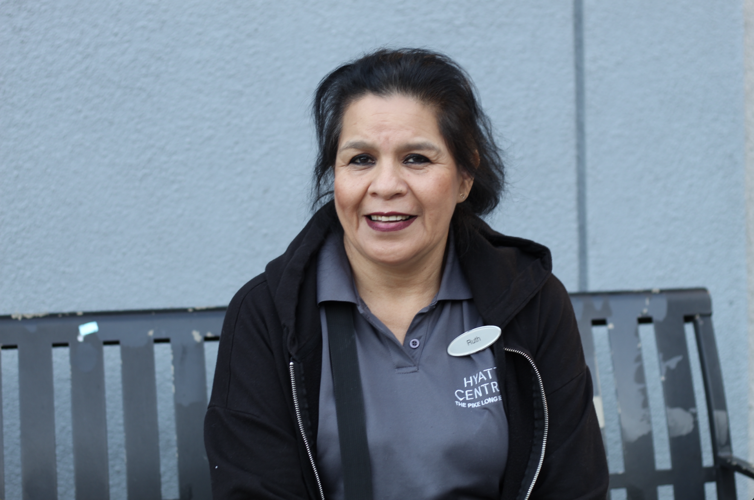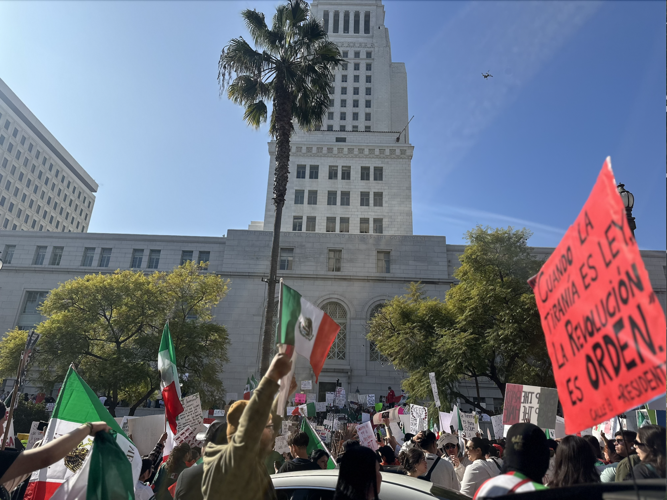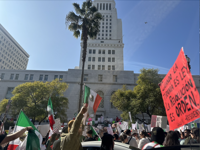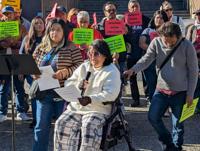
Ruth DeJesus takes a work break outside of the Hyatt Regency in Long Beach. (Image credit: Michelle Zacarias)
Ruth De Jesus had planned to stay home during the nationwide “A Day Without an Immigrant” protest, a powerful economic boycott meant to underscore the contributions of immigrant communities. But when her supervisor called her into work, the 54-year-old employee at the Hyatt Regency in Long Beach made the difficult decision to go in.
On Monday, a crowd gathered outside L.A. City Hall to protest Trump’s aggressive deportation plan and a surge in ICE raids. The nationwide boycott, which saw thousands of workers across the U.S. participate, aimed to underscore the critical role immigrants play in the economy. A similar protest took place in 2017 during President Donald Trump’s first term, drawing widespread participation. As Trump enters his second term, many are turning to protests and boycotts as part of a broader resistance to his administration’s immigration policies.
This year, the "Day Without an Immigrant" coincided with several pro-immigrant demonstrations, including a march in downtown Los Angeles on Sunday. But not all were able to participate in the rally, or even take the day off in protest.
“If it were up to me I would have stayed home—but I needed the hours,” De Jesus said.

Demonstrators rally in front of Los Angeles City Hall during one of several pro-immigrant protests that took place across the country. (Image credit: Brenda Verano)
De Jesus, who lives in Wilmington and commutes to Long Beach for her job, is one of many workers caught in the middle. Despite her desire to stand with her community, she faces the harsh reality of being a member of the working class in Southern California.
De Jesus arrived in the United States nearly fifty years ago and received amnesty under the Ronald Reagan administration. It wasn’t until 2016, during the first Trump administration, that she decided it was time to apply for permanent citizenship.
The mother of four partnered with the Coalition for Humane Immigrant Rights (CHIRLA) to expedite her legal paperwork. Founded in 1986 in response to the Immigration Reform and Control Act, CHIRLA has since been at the forefront of immigrant advocacy, focusing on policy reform and civic engagement. The organization offers a range of services, including legal assistance and “Know Your Rights” workshops, helping immigrant communities navigate the complexities of U.S. immigration law.
While participating in the boycott serves as an important act of solidarity with immigrant communities, for many immigrants, it is financially unfeasible. According to data from the California Immigrant Data Portal, wage disparities among immigrants are stark, with earnings varying significantly based on immigration status. In 2021, the median hourly wage for naturalized immigrants in California was $28, compared to $24 for permanent residents and $16 for undocumented immigrants.
Like many working-class Latinos, De Jesus struggles with constant rent hikes in one of the nation's most expensive regions. The soaring cost of living has pushed her to consider relocating to a state with a more affordable lifestyle.
Her experience underscores the tough choices faced by vulnerable immigrant communities, for whom skipping a protest is often not an option. Missing a day of work can mean losing essential wages or risking job security—especially for those in low-wage or hourly positions.
“At my job, they’ve been cutting our hours because business is slow,” De Jesus explained. “This whole week I don't have any hours scheduled – so I had to come today because it's my only day to come to work. ”
As immigrant communities continue to fight against policies that threaten their livelihoods, the divide between those who can afford to protest and those who cannot remains a difficult, often overlooked reality. For many, the fight for justice is not just a political battle—it’s a daily struggle for survival.













(0) comments
Welcome to the discussion.
Log In
Keep it Clean. Please avoid obscene, vulgar, lewd, racist or sexually-oriented language.
PLEASE TURN OFF YOUR CAPS LOCK.
Don't Threaten. Threats of harming another person will not be tolerated.
Be Truthful. Don't knowingly lie about anyone or anything.
Be Nice. No racism, sexism or any sort of -ism that is degrading to another person.
Be Proactive. Use the 'Report' link on each comment to let us know of abusive posts.
Share with Us. We'd love to hear eyewitness accounts, the history behind an article.